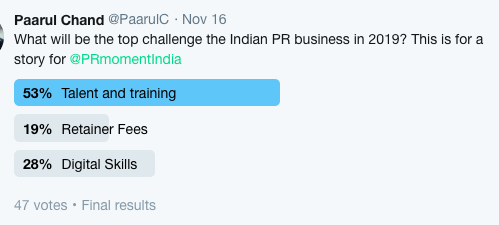Talent, low retainers challenges for PR in India in 2019, few solutions in sight
PR Insight
Paarul Chand
 It is the best of times, it is probably not the best of times. With due apologies to Charles Dickens, never has the PR business in India been at the cusp of so much potential. The role of PR is evolving and becoming more crucial to managing the reputation of businesses with the challenges of fake news and regular business disruption. At the same time, the legacy issues of shortage of good talent, the static retainers and measuring the impact of PR continue to plague the business with few short and mid-term solutions in sight.
It is the best of times, it is probably not the best of times. With due apologies to Charles Dickens, never has the PR business in India been at the cusp of so much potential. The role of PR is evolving and becoming more crucial to managing the reputation of businesses with the challenges of fake news and regular business disruption. At the same time, the legacy issues of shortage of good talent, the static retainers and measuring the impact of PR continue to plague the business with few short and mid-term solutions in sight.
A Twitter poll rated the problems facing the PR business in the following order:

The poll always drew a certain sense of weariness that these problems still carry on, with senior PR professionals commenting that its time to really have concrete solutions and not enter another year with the same issues still at play.
Legacy issues with the Indian PR business
Senior corporate communication professional, Melissa Arulappan, commented that "There are challenges for the PR businesses that have remained unchanged over the years like, for instance, the paucity of talent, suboptimal retainer fees and evaluation and measurement of PR. In more recent years, the effective integration of digital into mainstream programmes has also been a challenge as you have listed. These will continue to be challenges unless the industry makes a concerted and collaborative effort to address and mitigate the effect of them. "
Senior PR professional Rahul Rakesh echoed the same sentiment saying, "While the onus would largely be on individuals, the corporate and the consultancies will have to be more actively involved in training and development of their talent pool than mere lip services. Such efforts will go a long way in talent acquisition and retention while helping the workforce to be tomorrow-ready."
Rakesh added that, "People management has become more important because the industry is at the cusp of transformation. It is the best times to be a part of the industry. Mergers are happening, technologies (AI) is redefining the scope of work, making many of the existing talent pool redundant unless we adapt and change with the evolving needs of the industry. Not to forget the new entrants who enter industry half ready every year.
To solve some of these foundation challenges, Shalini Singh, founder, Galvanise PR, suggested that, " It would be great if the schools imparting training in PR introduce in their curriculum a six-month compulsory internship with the same PR firm – these internships should be at a nominal or no fee. This is important for the future teams to realise PR being their calling or not. It is also important for schools to train in ‘story-telling’ and writing skills, as well as behavioural skills such as respecting deadlines, thinking and analysing, reading and researching."
Redefining media engagement in 2019
The PR professional-journalist relationship has already been evolving for quite a while now with a seismic push from social media. In its current phase, Arulappan said there are further challenges underway pointing out that, "In 2019 the PR businesses will need to incorporate a changing definition of media into their campaigns. The emergence of fake news and the reducing role and impact of influencers will require PR professionals to explore and identify new channels of communication (in the truest sense of the word) like employees."
Arulappan added that, "I believe employees (besides micro influencers) have the potential to become the most credible, impactful and effective advocates that an organisation can have and their influence will be both internal and external. However, building communication and advocacy programmes around employees could be limiting if organisations do not have an enabling environment to support this. Many organisations, for instance, do not permit employees the use of social networks at work, while some do not even permit mobile phones. PR businesses will need to work around these challenges to drive campaigns where employees can emerge as the chief creators and tellers of an organisation's stories."
Continuing Digital Disruption
To say that digital disruption is affecting the PR business is very obvious. Ruchira Sharma, PR manager, Hats Off Digital and PR, advises looking at it from an implementation lens, "The implementation here is key. Digital disruption is something that must be embraced by all members of staff if our strategy is going to work, meaning that communication teams lose a little control – something they typically obsess over!".
Subhash Pais, head-Hansa PR, points to using automation at greater levels as a trend for 2019, "PR is an industry ripe for Robo disruption. Especially given the media and the retainers on offer. Strange that it hasn't happened properly yet."
As we enter 2019, it remains to be seen whether PR can finally take concrete steps to solve some of these issues.
If you enjoyed this article, you can subscribe for free to our weekly event and subscriber alerts.
Featured

PR professionals share their views on journalists publicly calling them out on story pitches

Auto blogger renders unconditional apology to Value 360 for defamatory posts

Hottest Indian startups of 2020, Paytm, Dreams 11 lead the charge: Wizikey Report




